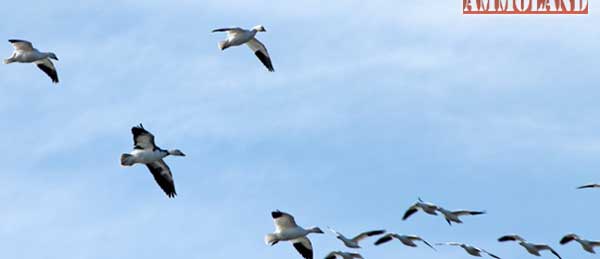

Dover, DE -(AmmoLand.com)- The Delaware Division of Fish & Wildlife is again implementing an annual Snow Goose Conservation Order, which began in 2009 as part of an Atlantic Flyway-wide effort to reduce the population of greater snow geese.
Snow goose numbers have reached levels that are causing extensive damage to their breeding grounds in the Canadian Arctic as well as depredation of the wetlands and agricultural areas where the birds overwinter in the Mid-Atlantic, including Delaware. The state’s 2016 Conservation Order to harvest snow geese will open Monday, Feb. 1 and run through Friday, Feb. 5, then will reopen Monday, Feb. 8 and run through Saturday, April 9.
The Conservation Order is a separate season open only for snow geese and occurs after Delaware’s regular waterfowl hunting seasons close. It was created with the intent of using hunting as a game management tool to reduce and stabilize the greater snow goose population. Last year, an estimated 13,684 snow geese were harvested by more than 730 hunters who participated in the Conservation Order in Delaware.
During the Conservation Order, hunters will be able to pursue snow geese every day except Sunday. Use of unplugged shotguns and electronic calls are allowed, with legal shooting hours starting a half-hour before sunrise and extended to a half-hour after sunset; there are no daily bag and possession limits. All other federal and state hunting regulations apply.
The Conservation Order will be closed on Saturday, Feb. 6, for a special statewide youth waterfowl hunting day. Regular snow goose hunting is also allowed on this day for all legally licensed waterfowl hunters in Delaware, but the special harvest methods described above are not allowed and the regular-season daily bag limit of 25 snow geese will be in effect on this day.
Most state wildlife areas will be open to hunting during the Conservation Order beginning Monday, Feb. 1. Wildlife areas in New Castle and Sussex counties will be open on a first-come, first-served basis with no registration required, except at the Assawoman Wildlife Area where hunters must self-register at the Assawoman check station. In Kent County, individual sign-in will be required at Woodland Beach, Little Creek and Ted Harvey wildlife areas. Sign-in will not be required at Blackiston, Milford Neck or Norman G. Wilder wildlife areas. To avoid conflicts with the spring 2016 wild turkey season, snow goose hunting will be prohibited on state wildlife areas after Friday, April 8. Bombay Hook and Prime Hook national wildlife refuges are not participating in the Conservation Order.
To participate in the Conservation Order, hunters must obtain a free Snow Goose Conservation Order permit number by registering at www.dnrec.delaware.gov/delhunt. Individuals needing assistance in obtaining the permit number should call 302-735-3600 during business hours Monday through Friday. Participants are also required to have a valid Delaware hunting license or a Maryland resident hunting license, a 2015-16 Delaware waterfowl stamp and a Delaware Harvest Information Program (HIP) number, with the HIP available at the website above. A federal waterfowl stamp is not required.
Once registered for the Snow Goose Conservation Order permit, hunters are required to keep this permit number in their possession while hunting and to report their hunting activity and success to the Division of Fish & Wildlife by Sunday, May 1 via website at www.dnrec.delaware.gov/delhunt; hunters may also report by phone at 302-735-3600 during business hours Monday through Friday.
For more information, please call 302-739-9912 or visit www.fw.delaware.gov.
Follow the Division of Fish & Wildlife on Facebook, https://www.facebook.com/DelawareFishWildlife.
About the Delaware Department of Natural Resources and Environmental Control (DNREC):
DNREC is committed to preserving the quality of Delaware’s environment, maintaining the health and safety of its residents, and protecting the natural systems upon which life depends. DNREC’s Division of Fish and Wildlife’s mission is to ensure that the freshwater, marine and wildlife resources of the State of Delaware will be conserved and managed for equitable and sustainable use.
For more information, visit: www.dnrec.delaware.gov.
